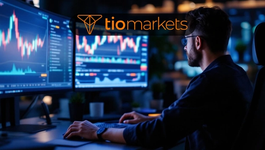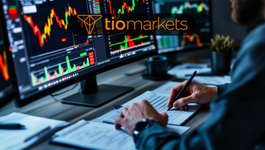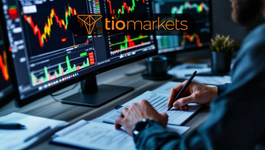What is a Trading Robot and Should You Use One?
BY TIOmarkets
|May 17, 2024Trading in the financial markets can be a complex and demanding task. Traders are constantly looking for ways to gain an edge and improve their profitability. One tool that has gained popularity in recent years is the trading robot. These automated systems claim to analyze market data and execute trades on behalf of users. But what exactly is a trading robot, and should you consider using one? Let's explore the concept further and weigh the pros and cons.
Understanding the Concept of a Trading Robot
In simple terms, a trading robot is a computer program designed to automatically trade financial instruments on your behalf. It utilizes algorithms and mathematical models to analyze market data, identify trading opportunities, and execute trades without human intervention.
By removing the emotional element from trading decisions, trading robots aim to improve efficiency and profitability. They can trade at a speed and frequency that would be impossible for a human trader to match.
Defining a Trading Robot
A trading robot, also known as an expert advisor or EA, is a software program that interfaces with a trading platform and executes trades based on predefined rules. These rules can be based on technical indicators, price patterns, or even fundamental analysis.
Trading robots can be fully automated, meaning they trade independently without any user intervention, or semi-automated, where the user has some control over the trading decisions made by the robot.
How Does a Trading Robot Work?
A trading robot works by analyzing market data in real-time. It looks for specific patterns or signals that indicate potential trading opportunities. Once a trading opportunity is identified, the robot then executes the trade according to the predefined rules.
Trading robots can operate on a variety of financial instruments, including stocks, currencies, and commodities. They can be programmed to trade based on various timeframes, from short-term scalping strategies to long-term trend following approaches.
One of the key advantages of using a trading robot is its ability to process vast amounts of data within seconds. This allows the robot to quickly identify and react to market changes, ensuring that trading opportunities are not missed. Additionally, trading robots can operate 24/7, taking advantage of global markets and trading sessions.
Another important aspect of trading robots is their ability to backtest trading strategies. By using historical market data, a trading robot can simulate trades and evaluate the performance of a strategy over time. This allows traders to fine-tune their strategies and optimize their trading robots for better results.
The Advantages of Using a Trading Robot
Using a trading robot can offer several advantages for traders. Let's explore some of the key benefits:
Efficiency and Speed
One of the primary benefits of using a trading robot is the ability to trade at a speed and frequency that would be impossible for a human trader to match. Trading robots can monitor multiple markets simultaneously, scan for trading opportunities, and execute trades within milliseconds.
This high-speed trading can be particularly advantageous in markets that experience rapid price movements or have high trading volumes, where time is of the essence to capture profitable opportunities.
Furthermore, trading robots can operate 24/7 without the need for breaks, allowing traders to take advantage of opportunities in different time zones and ensuring that no potentially lucrative trade is missed due to human limitations.
Eliminating Emotional Trading
Emotional trading can be detrimental to a trader's performance. Greed and fear often lead to impulsive and irrational trading decisions, which can result in losses. Trading robots remove the emotional element from trading by strictly following predefined rules and executing trades based on objective analysis.
This can help traders stay disciplined and avoid making decisions based on short-term market fluctuations or subjective biases.
Moreover, trading robots can backtest trading strategies using historical data to fine-tune their algorithms, ensuring consistent performance based on data-driven insights rather than emotional reactions to market events.
The Disadvantages of Using a Trading Robot
While trading robots offer several benefits, they also come with certain disadvantages. It's important to consider these drawbacks before deciding to use a trading robot:
Trading robots have become increasingly popular in the financial markets due to their ability to execute trades automatically based on pre-set parameters. However, this popularity has also attracted scammers who attempt to sell fraudulent or ineffective systems. These scams promise unrealistic profits and often require users to pay hefty upfront fees. As a result, traders need to exercise caution and thoroughly research any trading robot before investing their hard-earned money.
When considering a trading robot, look for verified user reviews, independent evaluations, and a transparent track record of performance. By conducting due diligence, traders can mitigate the risk of falling victim to trading robot scams.
The Risk of Scams
The popularity of trading robots has attracted scammers who attempt to sell fraudulent or ineffective systems. These scams promise unrealistic profits and often require users to pay hefty upfront fees. It's crucial to exercise caution and thoroughly research any trading robot before investing your money.
Look for verified user reviews, independent evaluations, and a transparent track record of performance before committing to a trading robot.
Moreover, the reliance on technology is another disadvantage of using trading robots. While automation can provide efficiency and convenience, it also introduces the risk of technical failures or glitches. A malfunctioning trading robot could potentially execute erroneous trades or fail to recognize changing market conditions, leading to financial losses for the trader.
Given the potential risks associated with technical failures, it's essential for traders to regularly monitor the performance of their trading robots. By staying vigilant and actively overseeing their automated trading systems, traders can quickly identify any issues and take corrective actions to prevent significant losses.
Key Features to Look for in a Trading Robot
When considering a trading robot, there are several key features to look for:
User-Friendly Interface
A trading robot should have a user-friendly interface that is easy to navigate and understand. It should provide clear instructions and options for customizing trading parameters.
Avoid overly complex systems that require extensive programming knowledge or have a steep learning curve.
Customizability and Control
A good trading robot should offer a range of customization options to suit your trading preferences and goals. Look for robots that allow you to adjust risk levels, select trading strategies, and set stop-loss and take-profit levels.
Having control over these parameters can help you tailor the robot to your specific trading style and risk tolerance.
Making the Decision: Should You Use a Trading Robot?
Deciding whether to use a trading robot ultimately depends on your trading needs and goals. Consider the following factors:
Assessing Your Trading Needs and Goals
Evaluate your trading objectives, time availability, and level of expertise. If you are a beginner trader with limited time to dedicate to trading, a trading robot could be a valuable tool to assist you.
However, if you enjoy the hands-on nature of trading and prefer to make your own trading decisions, a trading robot may not be the right fit for you.
Weighing the Pros and Cons
Weigh the advantages and disadvantages of using a trading robot based on your personal circumstances and risk tolerance. Consider the potential benefits of increased efficiency and reduced emotional bias, as well as the risks of scams and over-reliance on technology.
Ultimately, it's essential to make an informed decision that aligns with your trading objectives and comfort level.
In conclusion, a trading robot is a computer program designed to execute trades automatically. It offers several advantages, such as efficiency and the elimination of emotional trading, but also comes with risks, including the potential for scams and reliance on technology. Before deciding to use a trading robot, carefully assess your trading needs and goals and weigh the pros and cons. Remember to exercise caution and conduct thorough research to ensure you choose a reliable and suitable trading robot.
Ready to Elevate Your Trading Experience?
Embark on your trading journey with TIOmarkets, a top-rated forex broker trusted by over 170,000 traders across 170 countries. With our advanced online trading platform, you can trade over 300 instruments across Forex, indices, stocks, commodities, and futures markets, all with low fees. Plus, enhance your trading skills with our comprehensive educational resources and step-by-step guides. Don't miss out on the opportunity to trade smarter and more efficiently. Create a Trading Account today and join the TIOmarkets community!

Join us on social media

Behind every blog post lies the combined experience of the people working at TIOmarkets. We are a team of dedicated industry professionals and financial markets enthusiasts committed to providing you with trading education and financial markets commentary. Our goal is to help empower you with the knowledge you need to trade in the markets effectively.
Related Posts





